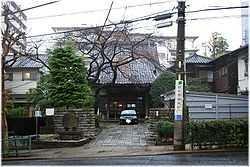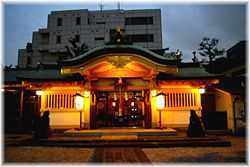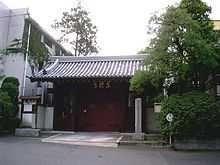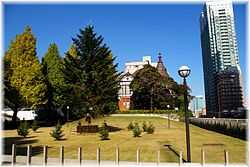Mita, Minato, Tokyo
Mita (三田) is a district of Minato, Tokyo, Japan, located near Akabanebashi Station on the Toei Ōedo Line, Tamachi Station on the Yamanote Line, and Mita Station on the Toei Mita Line.
Mita is home to Keio University, the Kuwait, Italy, Hungary, Papua New Guinea and Australian Embassy in Japan, and Mita Hachiman Jinja.
Notable places in Mita
Slopes
Many roads up to the Mita plateau have named slopes of historical significance. Each is marked by a wooden post which also explains the name.
Hijiri zaka 「聖坂」corresponds to the ancient Tōkaidō 「東海道」 road. As for the slope, the name changes from the top of Isarago zaka 「伊皿子坂」to the Nihon enoki dori 「二本榎通り」.
Gyoranzaka (魚藍坂) is a hill road in Mita 4-chome. It reaches the promontory from Gyoranzaka Crossing which results from the summit in Isaragozaka.
Katsurazaka (桂坂) is a hill road which lies between Takanawa 2-chome and 3-chome. A long time ago, ivy and vines covered the surface of this hill, though an alternate etymology says that a Buddhist priest who wore a wig (鬘 katsura) died along this slope suddenly on a return trip from Shinagawa.
Zakurozaka (石榴坂) is a hill road which crosses between Takanawa 3-chome and 4-chome. The area has many hotels. The street was probably named because there was a pomegranate tree (石榴 zakuro) in the middle of a slope a long time ago.
Hebizaka (蛇坂) is a slope which is in district four of Mita. Hebi means snake.
Anzenjizaka (安全寺坂) is a hill road crossing between Mita 3-chome and 4-chome. The temple of Anzenji was built here in the Edo era.
Horazaka is a hill road in Takanawa 3-chome. The name means "cavernous slope," in Japanese. It is alternatively called Horazaka (法螺坂) or "conch shell slope" and Borazaka (鯔坂坂) or "herring slope."
Hiyoshizaka (日吉坂) is a hill road which forms the border of Shirokane 2-chome and 4-chome. It goes from Meguro-dori in the southwest to Sakurada-dori in the northeast, and goes past the Kuwaharazaka (桑原坂) to the south. The name originates from the Noh actor Hiyoshi Kahei who lived nearby.
-

柘榴坂
Zakuro zaka -

聖坂
Hijiri zaka -

「葭見坂」
Yoshimi zaka -

top of Hora zaka
-

Katsura zaka
-
Bottom of Hiyosi zaka
Shinto shrines and Temples
In the early stages of the Edo period, the Shogun decided to extend Edo-Castle (江戸城) and ordered temples around there to move into here. From such a reason, there were many temples on the hill.Specially in Mita (三田) named Tera machi (寺町), there were many temples. As for shrines, there are its ancestor can go back to the Asuka (飛鳥時代) or Heian (平安時代) period.
Tokyo is the city which the aspect changes to rapidly, but the scenery of here didn't change.
-

「丸山神社」
Maruyama Jinja -

「済海寺」
Saikai-ji -

「大信寺」
Daishin-ji -

高野山別院
Koyasan Tokyo Betsuin -

「三田八幡神社」
Mita Hachiman Jinja -

「高輪神社」
Takanawa jinjya -

「東禅寺」
Tōzen-ji
Parks
In the Edo period, the daimyo’s (大名) mansion ( most are non-Tokugawa daimyo (外様大名)) ranged on the whole hill. The mansion was sold as the mansion of the high-ranking official in the government (顕官), Kazoku (=華族nobleman), in Meiji era. At present, the vacant lot is opened to the citizen as the park. By such historic process, the Parks locate in wide area and have a fine scene.
- Mitadai Kouen 「三田台公園」
- Toyouka cho Jidou Yuuen「豊岡町児童遊園」. Its former name is Toyooka Kouen「豊岡公園」
- children's park which exists in Mita 5-11-6 Minato, Tokyo, Japan. Its former name is Toyooka kōen 「豊岡公園」.
- Area:191㎡
- Nearby station: Shirokane-takanawa 「白金高輪」 Subway station
- Although a swing, sandbox, launching platform, box type swing, and drinking fountain place existed before, but it is removed now except drinking fountain place.
-

「亀塚公園」
Kamezuka kōen
Schools
- Mita Junior High School 「三田中学校」
- Mita Elementary School 「御田小学校」
- Takamatsu Junior High School 「高松中学」
- Friends School 「普連土学園」, Friends School
- Toukaidaigaku tanki daigaku「東海大学短期大学」
- Toukaidaigaku fuzoku Takanawadai koutougakkou「東海大学付属高輪台高等学校」
- Takanawadai koutougakkou「高輪台高等学校」
- Takanawadai chuugakkou「高輪台中学校」
- Seitoku tanki daigaku「聖徳大学幼児教育専門学校」
-

「松坂公園」
Matsuzakacho jido kōen -

「明治学院大学」[1]
Meiji Gakuin University -

慶應義塾大学
Keio University
See also
- Edo Meisho Zukai「江戸名所図解」
- Hasegawa Settan「長谷川雪旦」
| ||||||
| ||||||||||||||||||||||
Coordinates: 35°38′51″N 139°44′26″E / 35.64750°N 139.74056°E
